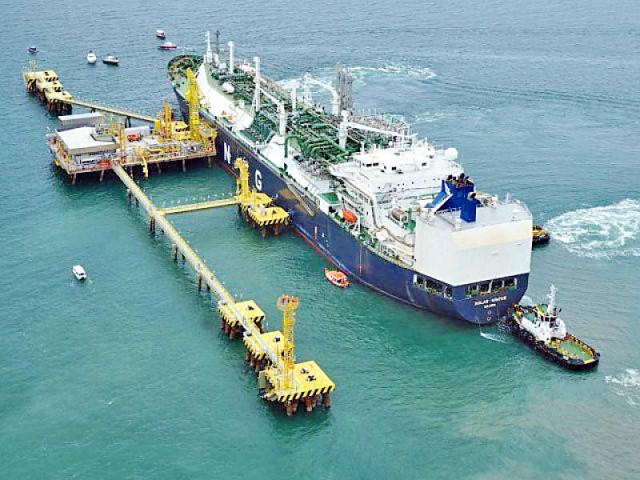Business group plans to supply LNG via tube trailers
Is teaming up with Chinese companies to introduce ‘virtual pipeline’ concept

The concept of virtual pipeline is not new to the world. In the entire North America, natural gas is transported by using this technology. PHOTO: FILE
The Associated Group is in the process of teaming up with a couple of Chinese companies to introduce ‘virtual pipeline’ concept in Pakistan, a model which can ease the pressure off public gas utilities, particularly in winter.
Under the model, the group will provide re-gasified liquefied natural gas (RLNG) to industrial and commercial units via land route. A dedicated fleet of tube trailers or trailer-mounted containers will be built and utilised for LNG transportation from the terminals at Port Qasim to industrial units in Sindh, Punjab and at later stages to the northern region.
The fleet will be equipped with all the necessary machinery and equipment for converting LNG into RLNG.
The group is already supplying RLNG to three Punjab-based power plants through the second LNG terminal under an agreement and is about to invest $500 million in another LNG terminal exclusively meant for the private sector. Seeking government’s approval, the Associated Group has inked an agreement with Universal Gas Distribution Company to sell its excess 150 million cubic feet of RLNG per day (mmcfd) to compressed natural gas (CNG) outlets.
“After government’s nod, the load of CNG sector will be shifted from system gas to the private sector,” said Iqbal Z Ahmad, Chairman of the Associated Group, while talking to The Express Tribune.
He pointed out that in Karachi alone, the demand existed for 200mmcfd and after adding another 700mmcfd via the third terminal they could be able to meet private-sector demand up to central Punjab.
“We as a group will take care of all necessary financing and logistical arrangements if the industry wants guaranteed supply of processed gas,” Ahmad said.
The concept of virtual pipeline is not new to the world. In the entire North America, natural gas is transported by using this technology. Also, many European and Asian countries are using this technology. In China alone, around 19 million tons of LNG was transported via land route last year.
In Pakistan, domestic, industrial and commercial consumers enjoyed cheap natural gas via a complex underground pipeline network until 2007 - the time when gas reserves started depleting in the country.
In 2015, Pakistan managed to bring first imported LNG cargo, which particularly helped Punjab-based industries regain the lost momentum.
Gas crisis worsens in Sindh, Balochistan
Still, a huge demand-supply gap of around three billion cubic feet exists, 25% of which is met through imported LNG. So far, the country has imported around 10 million tons of LNG and the volume is expected to reach 30 million tons by 2020. The virtual-pipeline concept has been welcomed by the CNG and industrial sectors, but they along with energy experts are also concerned about the viability of the model.
“This seems to be a good initiative for the industries considering the demand-supply gap in the energy sector,” remarked a spokesman for the All Pakistan Textile Mills Association.
“Nevertheless, we are concerned how this system will be handled as after a long struggle Punjab has started getting subsidised gas and the virtual pipeline will be only viable if we get LNG at competitive rates,” he added.
Echoing a similar concern, former Pakistan Electric Power Company (Pepco) managing director Tahir Basharat Cheema said, “With this initiative, the door for private-sector RLNG investment will be opened and once it all starts, it will take 6 to 12 months for imported LNG prices to reach competitive levels.”
Minister puts rumours to rest, says govt not cancelling any contract
He was of the view that it would be a very complicated system and a central monitoring and control system would have to be established to oversee the new LNG transportation mechanism.
The Associated Group chairman said the LNG price depended on market forces and a couple of surplus cargoes could bring down the rates. “Let the private sector jump in and it will bring competition results,” he said, adding logistical costs could be offset by collecting different taxes along with line and distribution losses, which constituted around 14% of the total system.
Published in The Express Tribune, February 10th, 2019.
Like Business on Facebook, follow @TribuneBiz on Twitter to stay informed and join in the conversation.



















COMMENTS
Comments are moderated and generally will be posted if they are on-topic and not abusive.
For more information, please see our Comments FAQ